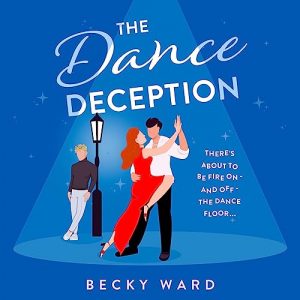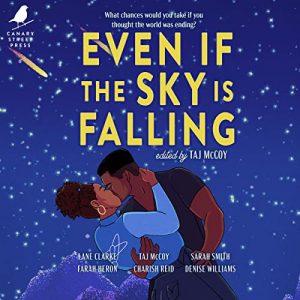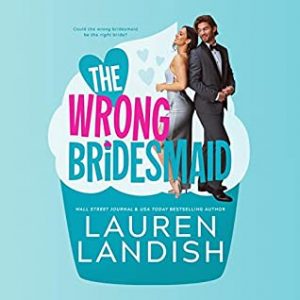The Dance Deception by Becky Ward, narrated by Alix Dunmore. Great narration, big plot problems.
I enjoy dance competitions such as Dancing With the Stars/Strictly Come Dancing and I like a fake relationship so I expected The Dance Deception to be right up my alley. The sample of the narration, by Alix Dunmore, also seemed very promising. It turned out the narration – which did indeed live up to its promise – was the best thing about the book.
Kate Wareing has been successful in securing a place in a new TV dance show “Fire on the Dance Floor” – a version of Strictly with Latin dances only and featuring “normal” people instead of stars/celebrities. As it is the first season, the competition will only last five weeks. It is winner-take-all, with the top contestant walking away with £25,000. Kate, recently out of work due to a messy break-up, could really use the money.
Kate is paired with Merle, a Frenchman who is all about winning. He’s also gorgeous. I call Merle “the arse”. He is, obviously, from the very beginning, a complete arse. Kate, however, is bowled over by Merle’s good looks. The accent probably helps too. Within a couple of days, Kate and Merle have moved from making out to full-on sex – including an interlude where Merle films Kate (without her consent or knowledge) dancing naked (long story). (Merle quickly identifies that Kate is a much better dancer after an orgasm – she’s more relaxed and less “in her head”). Kate is at first shocked and dismayed by the video but Merle assures her he never uses the cloud and he promises to delete it. (Did I mention Merle is an arse? I think we all know where this is going.)
Before their first performance, Kate is very nervous so Merle takes her to his dressing room (he’s the only professional dancer with a dressing room because of course: arse) to give her a good rogering to settle her down. By the time Kate is at the pub with her friends and after the taping, there are photos online of their interlude. Kate is humiliated, of course. But worse, it is revealed that Merle is married. This does explain why Merle never went anywhere with Kate after practice and all of their interludes (apart from the dressing room one) were in the dance studio. He was such a creep and I was super disappointed in Kate for ever falling for his BS to be honest.
The scandal is great for the show because publicity but terrible for Kate. The next day, Kate is paired with another pro-dancer, Aleksis, and Merle has taken Aleksis’s erstwhile partner (who happens to be the best dancer of all of the contestants), Amelia. Merle apparently told the producers that he could not stay on the show if he remained partnered with Kate. Aleksis, for some reason, seems to detest Kate so the new pairing does not start off well.
There’s a reason for Aleksis’s animosity: Merle’s wife is his sister, Sophia.
It’s a fairly brave romance novel which starts off with the heroine having consensual sex with someone other than the hero. The Dance Deception is perhaps braver than most because in week two of the competition, Kate decides to try and get over Merle by having sex with Warren (a friend of her flatmate’s new boyfriend). It’s very bad (and fairly amusing, albeit entirely at Warren’s expense) and after that, Warren is basically never heard from again.
By the end of that second week, Sophia has explained to Aleksis that Merle is a serial cheater and she has finally decided to kick him out. Her decision; Kate is not a homewrecker. If anything, Sophia is grateful to her. (Which, okay, unusual but I can go with that.)
After week two’s taping when it’s clear that Merle and Amelia are now a couple, Sophia suggests to Aleksis and Kate that they fake a romance to increase their popularity (it’s an audience vote as to who goes through to the next round). So they do.
Nobody seems to question that the show has been going for barely more than two weeks and Kate has now been in TWO “relationships” with her professional dance partners. (And they don’t even know about Warren.) I’m all for sex positivity but this is a romance. Even when she starts thinking Aleksis is a nice guy and better looking than she first appreciated, she’s still hung up on Merle.
By the end of week three, Aleksis and Kate move in together to give the tabloids more fodder and to boost their chances of a higher audience vote.
By week four, Aleksis and Kate are in a real relationship.
The entire book takes place over the five weeks of the competition.
I did not feel confident that Aleksis and Kate really knew each other. I wasn’t confident in their relationship because I didn’t feel like I knew Aleksis all that well myself. I was left with the feeling that the only reason Kate was able to get over Merle wasn’t because he was a complete arse but because Aleksis started paying attention to her. I didn’t get the impression that Kate would do very well on her own. I thought she probably needed some time by herself to decide what she truly wanted in her life rather than bouncing from one man to another. Aleksis was certainly the best man in the bunch however, so she ended up with the best possible choice.
Given how OTT the story was to that point, I was extremely disappointed in the ending. Yes, there is a HFN/HEA but the arse didn’t get nearly enough of a comeuppance IMO. As expected, the video makes another appearance in the storyline and I will give the author credit for taking that into a somewhat unexpected place but she lost those points when the tension fizzled out completely.
On a much more positive note, the narration was very good. Alix Dunmore’s accent work was particularly impressive, with Merle’s French diction and Aleksis (and Sophia’s) Latvian (Russian-like) tones. Plus there were various British accents used as well.
Ms. Dunmore made Kate more sympathetic than I would have otherwise found her I think. I don’t blame the narration for my dislike of the “Fire on the Dance Floor” host, Kimberley. Kimberley sounded like exactly a cheesy TV show host with that annoying cadence, over-the-top enthusiasm and fake sincerity. Still, I’m glad there wasn’t more of her.
My only real criticism of the narration was that most of the character differentiation was based on accent and not pitch. There wasn’t any discernible difference between Aleksis and Sophia for example, which did lead to some occasional confusion. However, the rest of the performance was very good. If not for Alix Dunmore’s skill, I’m not sure I could have finished the audiobook.
The story itself was well-written (which is why the grade is as high as it is) – my issues were all with the plot which was just too much for me.
Grade: C













